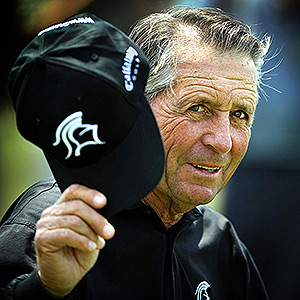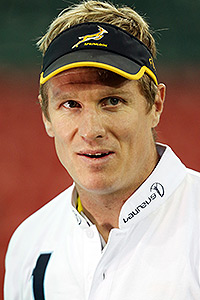Of appointments and disappointments
A young referee, taking his first steps into international refereeing was on his way somewhere, flight business class, hotels five-star.
There he sat in the warming spring sun on a wine estate while a generous barbecue was sizzling. The appointments to the November Tests had just been made known and he expressed his disappoint of the class of Test he had been appointed to, and he voiced his disappointment which verged on indignation and anger.
Just before Christmas in 2013, Father Christopher Clohessy preached his Sunday sermon, as he does every Sunday. This time he started off by saying: "The very best people around us, the best of the best, are those who have experienced defeat, those who have been through suffering, those who have endured struggle, those who know what it means to lose, but have found their way out of these things. They have an appreciation, an understanding of life that fills them with compassion, with gentleness. People like that don't just happen."
That he preached this sermon in Newlands and not far from the rugby ground may have made the connection to sportsmen obvious.
All sportsmen – like all other human beings – suffer disappointment.
Just recently on TV, Ali Bacher interviewed Gary Player, who is probably the greatest sportsman South Africa has ever had. Bacher said to Player that it was said that pressure brought out the best in him. Not having any trace of false modesty, Player agreed and then went on to say something which teaches us all a valuable lesson.
" This is what people don't understand about sports. It's not always the man ho has the most ability, it's not always the man in golf who hits the ball furthest and not always the man who has the point of view that is the best or his strength. It comes from the mind. You've got to have the right mind to accept adversity. I often say that in my opinion the best athlete is the man who enjoys adversity and learns from it. If you can tell yourself, Look it's a part of life you've go to enjoy it. You're going to have it, so accept it.
This is what people don't understand about sports. It's not always the man ho has the most ability, it's not always the man in golf who hits the ball furthest and not always the man who has the point of view that is the best or his strength. It comes from the mind. You've got to have the right mind to accept adversity. I often say that in my opinion the best athlete is the man who enjoys adversity and learns from it. If you can tell yourself, Look it's a part of life you've go to enjoy it. You're going to have it, so accept it.
"There's a great sense of entitlement. Young people are brought up not knowing what adversity is."
He then says one of the ways to soften the buffet of disappointment is to make comparisons. The old adage: "I thought I was badly off when I had no shoes till I met a man who had no feet."
Here is an example of a comparison.
There are thousands of referees around the rugby world.
In November there were 37 matches and 19 referees were appointed to referee those 37 matches.
The young man who complained had been appointed to two of those matches, just not of the high-profile that he, who would claim to be a servant of the game, wanted.
And so he groused about his appointment and those who had made them. But there were thousands of referees around the world who would have been in their seventh heaven of delight just to have had one of those Tests.
Disappointment is a sportsman's lot. Sometimes the disappointment comes from others. Sometimes it is selfmade. Sometimes it is accidental.
A player gets dropped or not selected and he is disappointed. A referee does not get the appointment he would like. He is disappointed.
Gary Player says you should embrace this and learn from it – not mope, try harder and be gracious.
John Gainsford was acknowledge as the great centre in the world in the 1960s, one of the greatest Springboks of all time. After 33 consecutive Tests he got dropped. France were on tour, and Gainsford played the first three Tests and the fourth was at Newlands, Gainsford's home ground. It was to be his last match, eight days after his 29th birthday. Because it was going to be his last match his parents-in-law came to Cape Town from Graaff-Reinet, and for the only time in his career Gainsford was dropped.
Syd Nomis was chosen in his place and Gainsford sent him a telegram: "Say I'm sad, man, say I'm glad, man. Have a great game."
In those blunt days, Gainsford heard that he had been dropped on the radio.
Many Springboks dropped were great players, like Bennie Osler, Naas Botha, Danie Craven, Frik du Preez and Mannetjies Roux. When Francois Pienaar was not chosen in 1996, there was an uproar. It is all a part of being a sportsman. And sometimes it happens to referees.
Dropping/not selecting is somebody else's decision, and that is true of referees who sometimes have an inflated belief in their ability.
In the end, as will happen in the very end, somebody else judges us. We have to accept that judgement and, according to Player, accept it and learn from it, even if all we learn is humility.
 Think of Jean de Villiers and his World Cup disappointments. He was chosen in 2003 but injured a shoulder in the Springboks' warm-up game against the Falcons and did not go. In 2007 he suffered a torn bicep in the opening pool match with Samoa. In 2011 he popped a rib against Wales and started when the Springboks lost to Australia in the quarterfinal.
Think of Jean de Villiers and his World Cup disappointments. He was chosen in 2003 but injured a shoulder in the Springboks' warm-up game against the Falcons and did not go. In 2007 he suffered a torn bicep in the opening pool match with Samoa. In 2011 he popped a rib against Wales and started when the Springboks lost to Australia in the quarterfinal.
Chosen for three World Cups he has played a total of 160 minutes at World Cups and may well miss out this time.
Looking back, De Villiers, a man to be proud of, says: "I still believe if I had not gone through those injuries I would not have reached 100 Tests. I learned most of all how to overcome adversity – they were real-life lessons because I' d always played in the first team from school upwards. I'd never been dropped and had played for all my representative teams at provincial and national level. Until that first cap it was smooth sailing and I didn't need to work too hard for anything. It means much more when you lose it for a while. If I had to do it all over again I would probably want it to be the same. I've loved rugby from the start and it still gives me so much joy."
He can, too, compare with those millions who did not have all the achievements which he has achieved. Jean de Villiers fits what Father Clohessy said – one of the very best who had experienced disappointment, defeat and suffering, had had to find his way out of it till, as Player said, he could embrace suffering.
If you could imagine a person who had never been disappointed, never had any pain, not even a toothache or a headache, had always got whatever he wanted, you would be looking at a monster, devoid of all feeling.
Gratitude for blessings is better than resenting disappointment. Gratitude for all those who have helped and still help is better than anger at those seen as not providing even more.
There can be nothing sadder in refereeing than the referee who gives up and goes away filled with bitter resentment in the belief that he was hard done-by, forgetful of all the good things in rugby and refereeing and forgetful of all that other people had done along the way. He ends up bitter and only he knows he is bitter. He suffers but nobody else does. It would be better to accentuate the positive and go away from refereeing happy and grateful.
I was sorry when I tore a calf muscle and could not referee at Newlands till I had to make way outside the ground for a young man in a wheelchair.
By Paul Dobson
@rugby365com









